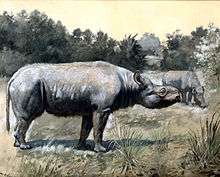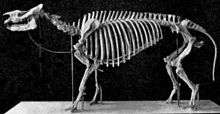Subhyracodon
Subhyracodon is an extinct genus of hornless rhinoceroses. With a length of 2.4 m (8 ft) and a weight estimated of 381.3 kg (in S. mitis), it was a tapir-sized herbivore on the plains of early Oligocene South Dakota 33 million years ago (White River Fauna). It coexisted with other perissodactyls such as horses, brontotheres, and chalicotheres.[5] Subhyracodon had no horns, relying more on its speed to escape from predators, but a species found at Wind Cave National Park had a pair of bony nasal ridges. The genus Caenopus and species originally referred to as Aceratherium were synonymized into Subhyracodon.[6]

Life restoration by Charles R. Knight
Skull
| Subhyracodon | |
|---|---|
 | |
| Subhyracodon occidentalis skeleton | |
| Scientific classification | |
| Kingdom: | |
| Phylum: | |
| Class: | |
| Order: | |
| Family: | |
| Genus: | †Subhyracodon (Brandt, 1878) |
| Type species | |
| †Rhinoceros occidentalis | |
| Species[2] | |
| |
| Synonyms | |
References
- Prothero, 2005, p. 41.
- Prothero, 2005, pp. 40-47.
- McKenna & Bell, 1997, p. 481.
- Prothero, 2005, p. 43.
- "Archived copy". Archived from the original on 2012-07-10. Retrieved 2012-05-29.CS1 maint: archived copy as title (link)
- C.C. O'Harra (1920). The White River Badlands. Rapid City, SD: South Dakota School of Mines. p. 181.
External links
This article is issued from Wikipedia. The text is licensed under Creative Commons - Attribution - Sharealike. Additional terms may apply for the media files.